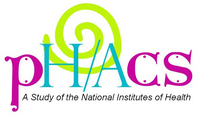Overview
 Initiated in 2005 to address long-term outcomes of perinatal HIV and in utero antiretroviral exposure, the Pediatric HIV/AIDS Cohort Study (PHACS) has evolved over time to follow affected populations from infancy through adolescence and into young adulthood, with an expanding focus on reproductive-age individuals and the effects of HIV and antiretroviral therapy across the life course.
Initiated in 2005 to address long-term outcomes of perinatal HIV and in utero antiretroviral exposure, the Pediatric HIV/AIDS Cohort Study (PHACS) has evolved over time to follow affected populations from infancy through adolescence and into young adulthood, with an expanding focus on reproductive-age individuals and the effects of HIV and antiretroviral therapy across the life course.
PHACS is funded through Cooperative Agreements (U19) designed to advance understanding of the developmental and clinical course of persons living with HIV and those with perinatally acquired HIV across the reproductive life span in the United States. PHACS is funded by the NICHD Maternal and Pediatric Infectious Disease Branch, National Institute of Allergy and Infectious Diseases, National Institute of Dental and Craniofacial Research, National Institute on Drug Abuse, and the National Heart, Lung, and Blood Institute.
Currently funded PHACS U19 awards include:
- Study of Treatment And Reproductive (STAR) Outcomes
- Pediatric HIV/AIDS Cohort Study (PHACS): Research on Immune Aging, Sexual and Reproductive Health, and Perinatal Acquisition: Elucidating Relationships in HIV (RISE)
Topic Areas
PHACS supports rigorous cohort research to characterize health outcomes, including but not limited to reproductive system pathophysiology, neurodevelopment, immune and metabolic function, and other systemic sequelae.
Examples of research being addressed as part of this program include but are not limited to:
- Reproductive system pathology and other gynecologic conditions, fertility, sexual maturation, nutrition, growth, endocrine, and bone development
- Genomic and metabolomic outcomes of exposure to ART and HIV in reproductive age people
- Studies on the effect of Human Papillomavirus (HPV) on mucosal immunity and HPV acquisition, clearance, and persistence among those living with HIV
- Studies on alcohol and drug exposure outcomes in individuals living with perinatally acquired HIV
- Research on the effects of ART treatment on oral cells/tissues, bone mineral density, and tooth development; mucosal immunity; disease biomarkers; persistence, latency and reservoirs for HIV and pathogens causing oral diseases
- Studies on epigenetic aging on the early development of co-morbidities, and complications
- Research on the effects of HIV and HIV treatment on fertility, pregnancy and post-partum outcomes, complications, co-morbidities, and co-infections including sexually transmitted infections (STI's)
- Creation of centralized data systems, standardized terminology, and data linkage/interoperability across cohorts
- Scientific collaborations integrating multi-site PHACS data and broader datasets
More Information
- NICHD Contacts: Denise Russo and Allahna Esber
 BACK TO TOP
BACK TO TOP